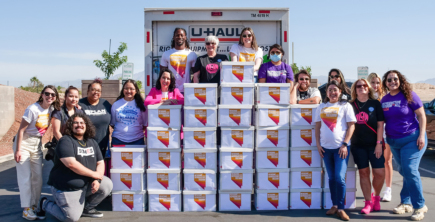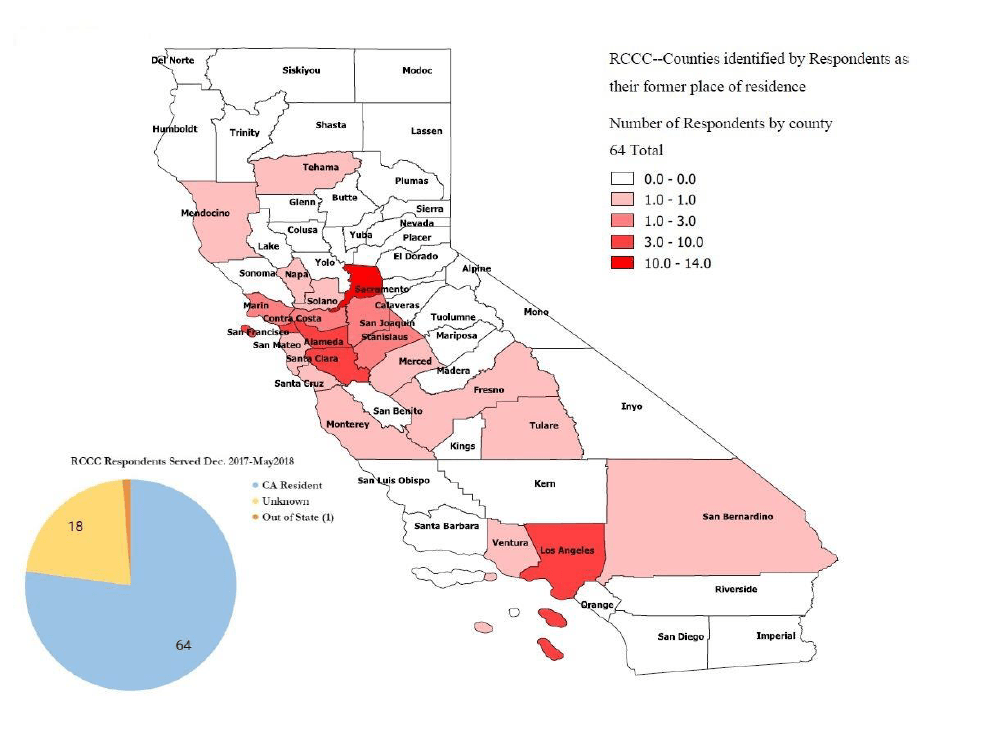
Our Community

Mario Martinez at Centro Legal de la Raza shares the following story, underscoring the importance of investing in nonprofit capacity building, such as the Data & Technology Initiative for Immigration Nonprofits. Centro Legal de la Raza and Tides are partners in this effort.
In June 2018, a county jail in Elk Grove, California—the Rio Cosumnes Correctional Center (RCCC)—terminated its contract with Immigration and Customs Enforcement (ICE). The decision by the Sacramento County Board of Supervisors was a significant victory for impacted family members and advocates who had worked arduously to end the jail’s five-year $33 million agreement to imprison over 200 immigrant community members at any given time. But the contract termination raised a new challenge: What was ICE going to do with the community members detained at RCCC?
Obtaining accurate information about detained community members from a secretive and unaccountable federal agency is nearly impossible—especially one whose modus operandi is to terrorize immigrant communities with mass raids and targeted enforcement actions at unexpected hours. So it was no surprise that family members and immigration advocates received virtually no information from ICE about what would happen to the community members at RCCC after the contract-term ended. The prevailing sentiment was that many would be transferred out of state to remote jails and detention facilities, preventing families from keeping in touch with their loved ones and preventing attorneys from communicating with or effectively representing their clients.
During recurring visits to jails and detention centers, advocates typically conduct “legal intakes”: a process whereby community members’ experiences are documented. Legal intakes capture details about their migration journey, challenges they faced along the way, as well as violations inflicted during detention—information that can support policy advocacy and help determine best methods of litigation.
Obtaining accurate information about detained community members from a secretive and unaccountable federal agency is nearly impossible.
When a jail terminates its contract with ICE without any indication of what will happen to community members, families and advocate organizations step in. Mario Martinez, at the time a program coordinator at an advocate organization, proposed a solution—aggregate and analyze information gathered via legal intakes in the preceding months to gain insight.
Aggregating just two data points from RCCC intakes—the prior city and the county of residence of each detained community member—proved invaluable. The aggregated map (shown below) revealed that out-of-state transfers would be unjust, as community members detained at the facility were individuals with strong family ties throughout the area surrounding RCCC. Instead, advocates urged, it would be more appropriate to allow immigrants to return to their families and communities.

Even collecting just two data points can help defend immigrant rights. In 2018, this map showed how transferring detained immigrant community members from a facility near Sacramento to out-of-state facilities would be unjust, as the individuals detained had strong family ties in the area.
The analysis of legal intakes from RCCC was not perfect, but it was a start. Leveraging the available information had immediate effects for individuals and families affected by the jail’s contract-end with ICE. This experience would go on to shape how information was collected, aggregated, and shared among organizations and immigration advocates in the months and years to follow.
In October 2019, Governor Gavin Newsom signed a new bill (AB32) into California law. The bill ended the use of all private, for-profit prisons in the state, including immigration detention facilities known to treat community members inhumanely. Martinez and colleagues from Centro Legal de la Raza immediately began to prepare for the closure of the Mesa Verde Detention Facility (MVDF)—a 400-bed center in Bakersfield, CA–using lessons learned from the RCCC experience.
Partnering with the UC Davis Global Migration Center, Centro Legal systematically collected information from past intakes that would be relevant to MVDF’s closure. Its detention team also pursued key partnerships to leverage technology that provided real-time information.
Unfortunately, despite the passing of AB32, MVDF never closed. ICE dodged detention facility closures by renewing its long-term contracts with facilities just two weeks prior to the law’s implementation. While Centro Legal is still supporting efforts to fight ICE’s maneuver, the information-gathering strategy used to prepare for MVDF’s closure laid groundwork for the unexpected: a COVID-19 pandemic.
When the pandemic began, immigration advocates focused on getting immigrants out of crowded detention facilities before the virus spread. To file urgent humanitarian parole requests, Centro Legal worked alongside detained community members and advocates from the Bay Area to the Central Valley. Together they quickly compiled a list of those who were medically vulnerable.
Information asymmetry, such as lack of access to real-time information, enables systematic violations of immigrant rights.
Simultaneously, to support broader litigation efforts, a collaboration formed among Centro Legal, the UC Davis Global Migration Center, Innovation Law Lab, and Mobile Pathways to systematically identify nearly 300 community members detained at MVDF using intake information collected by partner organizations of the California Collaborative for Immigrant Justice.
Students from the Research, Resist, Abolish ICE internship, coordinated by Centro Legal, bolstered these efforts through extensive research and analysis. They identified how ICE operated during the pandemic—key information that would support multiple initiatives to try to halt ICE’s rampant disregard of immigrant communities, including ongoing transfers to MVDF and the Yuba County Jail.
Through coordination with numerous partners, the level of information available to family members, the community, and immigration advocates in the Northern California region was exponentially greater than ever before. With this information, Centro Legal de la Raza intends to address the root causes of immigration detention and abolish the systems of oppression ICE has created in California.
The examples described above underscore how information asymmetry, such as lack of access to real-time information, enables systematic violations of immigrant rights. Meanwhile, nonprofits defending human rights lack data infrastructure and technology capacity—or the ability to effectively manage, analyze, share, and keep information secure once it is collected. With many immigration advocates tracking information on paper intake forms or ad-hoc online spreadsheets rather than on robust, secure databases, data integrity is imperative.
Not having the right infrastructure and network standards in place can lead to slow, outdated, or inaccurate information regarding impacted immigrants.
Not having the right infrastructure and network standards in place can lead to slow, outdated, or inaccurate information regarding impacted immigrants. Centro Legal de la Raza demonstrated what is possible when information is not only accurately collected, but effectively managed and utilized across a network of partners to elevate the voices of those most affected by an oppressive system.
While nonprofits and advocates are best positioned to serve community members, they are often ill-equipped or unable to invest in data infrastructure and technology—a crucial area that could enhance their efforts. Unfortunately, philanthropy does not help. In a survey led by Accenture, 86% of nonprofit respondents pointed to the cost of purchasing technology as a key barrier to adoption. Organizations hesitate to include this area of work in funding proposals because they worry funders won’t support it.
A report by the Immigration Advocates Network confirms how under-resourced nonprofits are. Less than 40 percent of surveyed organizations identified someone to oversee quality of data, and “…only 31 percent said they can easily create the lists of clients and supporters they need for outreach efforts or programs.” In a time when accurate information and real-time reporting are the norm, nonprofits lack the necessary tools to share infographics that could educate the public and even affect policy.
Tides recognizes that data infrastructure and technology capacity are crucial for nonprofits—especially immigrant-focused organizations—to better serve their communities. In 2019, Tides talked to over 75 grassroots immigration movement leaders about their information challenges. The insights gathered from these conversations resulted in the Tides’ initiative Data & Technology for Immigration Nonprofits. The pilot program connected donors, fully-funded data and technology experts, and nonprofits to collectively optimize data infrastructure to advance and amplify impact.
We call on philanthropic partners to fund capacity building for often overlooked grassroots organizations and create sustainable data and technology solutions that positively impact the sector. Join us in following movement leaders like Centro Legal de la Raza who know best what their organizations and community members need.
Tides is launching the next phase of its partner-led work to support the development of solutions and tools that advance a group of California immigration legal services groups. To learn more, check out this report and contact Roxana Shirkhoda at [email protected].

Our Community

Crisis Response Fund

Crisis Response Fund

Read the stories and hear the voices of social change leaders fighting for justice.